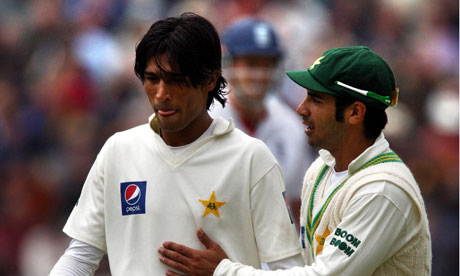
The three Pakistan cricketers are unlucky. Their misfortune is that they have been caught, albeit via a sting of the News of the World. Not many cricketers who get caught up with shady figures and the used banknotes of the betting underworld are found out.
So on the rare occasion when there is credible evidence to hand, the book has to be thrown in their direction. There may not be many other opportunities for cricket to set an example to any youngster who wishes to make a legitimate living from the game (though the Essex bowler Mervyn Westfield is scheduled to appear in court next week).
If the integrity of cricket is compromised – even via the odd intentional no-ball – then there is little point in playing the game and absolutely no point in anybody paying to watch it. Thus in Doha the urgency to deliver a fierce deterrent to players everywhere has outweighed the need to make the punishment fit the crime.
The ICC tribunal has delivered that fierce deterrent. Assuming the sanctions stand, and whether or not the criminal charges announced yesterday are proven, there is little chance of Salman Butt and Mohammed Asif resuming their international careers. Butt was banned for 10 years, five of which are suspended, so at the very best he will be 31 when his punishment has been served. Asif, taking into account that two of his seven-year sentence are suspended, will be 33 when he can play again. Butt has never been a great player so is unlikely to be deemed indispensable in 2016 while Asif will be near the end of the natural life of an opening bowler.
In five years' time Amir will be 23. Provided he can find the necessary resolve necessary to resuscitate what began as a glittering career, he could play again. Indeed the majority of the cricketing world will surely hope that he does reappear. If anyone is a victim in this distressing episode, it is Amir.
At first glance the acts Butt, Asif and Amir are accused of were hardly the most heinous. The no-balls at Lord's were not going to change the course of the match and no one, as far as we know, was financially damaged by those deliveries. Here were three small (over) steps for man, but one giant leap for cricketing kind.
There have been plenty of intentional no-balls before, delivered out of mischief, malice or hunger. On a dull, cold day it often seemed a cunning ploy, appreciated by all the combatants out on the field – including the umpires – to deliver a no-ball at 12.59pm to ensure that everyone would not have to wait for the completion of another over before trudging off for an eagerly anticipated lunch. That extra delivery sped everyone to the appointed hour most conveniently.
Mike Procter, a charismatic fast bowler before becoming an ICC match referee, has explained how he used to bowl no-ball bouncers at tailenders on purpose. The plan was to put the wind up timorous batsmen and still ensure that there were six balls available in the over to bowl them out. Which Procter invariably did. Far more nefarious was the no-ball deliberately delivered by a fast bowler with a bent arm. Such deliveries could maim unsuspecting batsmen and could cause far more harm than anything conjured up by Asif and Amir at Lord's last August.
Yet the yearning to go to draconian lengths to deter fixing of any sort is justifiable. Before any professional cricketer contemplates that preordained wide or no-ball, maybe a bell will now ring in his head: "Remember what happened to Asif and Amir." However, even beyond Pakistan there should be sympathy for Amir. By contrast Butt prompts little compassion, if only because he appears to have made so many of us look stupid. In 2010 it seemed as if Butt – calm, urbane and softly spoken – was just the man to restore a semblance of order to Pakistan cricket, especially after he led his team to victory over Australia at Headingley. Then we saw the beady eyes of the Pakistan captain, who was standing at mid-off at Lord's and staring, not at the batsmen, but at the precise location of Amir's feet as he delivered the ball. Soon the stench of betrayal was in the air.
Throughout that 2010 summer we had marvelled at the old-fashioned virtues of swing and cut in Asif's bowling. At 28, and after several run-ins with the authorities, he should know the score.
But Amir is still an 18-year-old, albeit one who can boast 51 Test wickets. And most 18-year-olds, upon entering an international dressing room, simply do as they are told.







2 comments:
Amir shoud be given the second and this are all the plan of indian chairman SHRAD PAWAR,ask him to resign
ICC should give Amir one more chance because he going to be the Bowler of the Future.And the world are facing fast bowler shortage
ok
Post a Comment